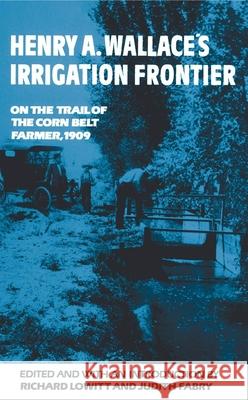Henry A. Wallace's Irrigation Frontier » książka
Henry A. Wallace's Irrigation Frontier
ISBN-13: 9780806139258 / Angielski / Miękka / 2007 / 244 str.
When Henry A. Wallace had completed his junior year at Iowa State College in 1909, his family sent him on a western tour "on the trail of the Corn Belt Farmer." Wallace's articles, collected and reprinted here for the first time, are lively descriptions of up-and-coming western locales such as Amarillo, Texas; Phoenix, Arizona; the orange groves of southern California;the San Joaquin and Sacramento valleys; and the Greeley District of Colorado. Wallace made a specialty of down-home conversation with farming families and of cross-examining the real-estate agents who profited from the government's commitment to sell water rights to the new property owners. Modern day readers will prize Wallace's clear, expert analysis of the different environments that he visited and his farmer-conservationist ethic. Social historians will be interested as he explains how the closer proximity of irrigated farms and greater abundance of neighbors would produce prosperous communities. They will be fascinated to learn how the cooperative aspects of irrigation farming tempered the independence of the immigrants from the Corn Belt. "Wallace, a future Secretary of Agriculture, Vice President, and candidate for the presidency, had not yet celebrated his twenty-first birthday when he made the tour on which his contribution to the book was based, and his essays testify to the strength of the young man's intellect and his talents as a traveler and illustrate his point of view."---Richard S. Kirkendall, University of Washington
When Henry A. Wallace had completed his junior year at Iowa State College in 1909, his family sent him on a western tour "on the trail of the Corn Belt Farmer." Wallaces articles, collected and reprinted here for the first time, are lively descriptions of up-and-coming western locales such as Amarillo, Texas; Phoenix, Arizona; the orange groves of southern California;the San Joaquin and Sacramento valleys; and the Greeley District of Colorado. Wallace made a specialty of down-home conversation with farming families and of cross-examining the real-estate agents who profited from the governments commitment to sell water rights to the new property owners. Modern day readers will prize Wallaces clear, expert analysis of the different environments that he visited and his farmer-conservationist ethic. Social historians will be interested as he explains how the closer proximity of irrigated farms and greater abundance of neighbors would produce prosperous communities. They will be fascinated to learn how the cooperative aspects of irrigation farming tempered the independence of the immigrants from the Corn Belt."Wallace, a future Secretary of Agriculture, Vice President, and candidate for the presidency, had not yet celebrated his twenty-first birthday when he made the tour on which his contribution to the book was based, and his essays testify to the strength of the young mans intellect and his talents as a traveler and illustrate his point of view."---Richard S. Kirkendall, University of Washington











